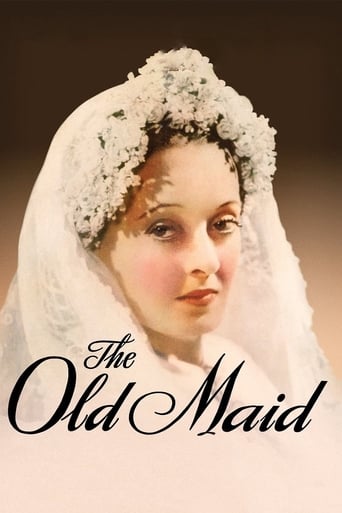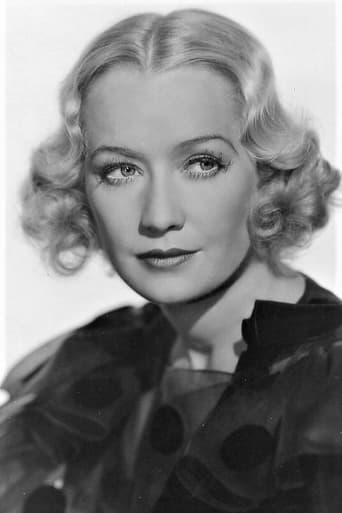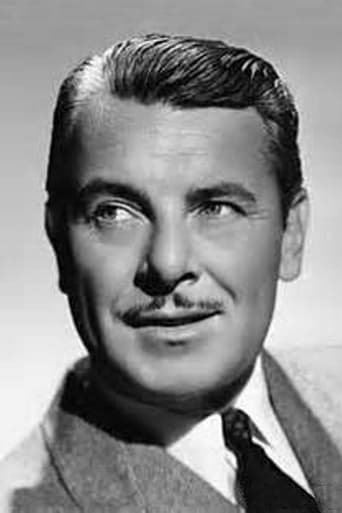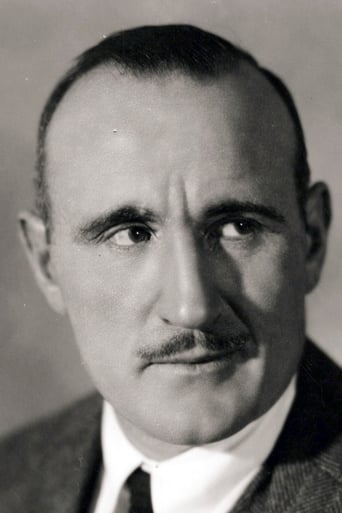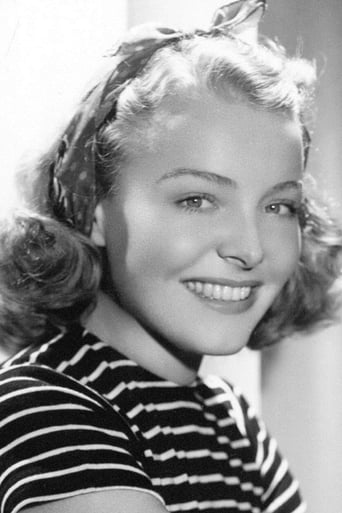Beystiman
It's fun, it's light, [but] it has a hard time when its tries to get heavy.
SparkMore
n my opinion it was a great movie with some interesting elements, even though having some plot holes and the ending probably was just too messy and crammed together, but still fun to watch and not your casual movie that is similar to all other ones.
AnhartLinkin
This story has more twists and turns than a second-rate soap opera.
Kaydan Christian
A terrific literary drama and character piece that shows how the process of creating art can be seen differently by those doing it and those looking at it from the outside.
sdave7596
Bette Davis and Miriam Hopkins shine in this Warner Bros. melodrama, "The Old Maid" released in 1939, a banner year for Davis at the studio. This was one of four very fine films she did that year, making her the reigning queen of the studio. In this one, Davis and Hopkins are cousins in the 1800's. Hopkins rejects her beau (George Brent) to marry into a wealthy family, the Ralstons. Davis has the hots for Brent (one of her frequent co-stars during this period) and gets pregnant with his baby. However, he goes off to fight the Civil War and is killed. At a time when being an unwed mother was not an option, Davis agrees to move in with Hopkins, now a widow with two children of her own. The child, Tina (Jane Bryan) grows up knowing she is a foundling, but always calls Hopkins "mummy." Davis does not let on she is Tina's mother, but rather an aunt; this fills her with resentment, and into a bitter old maid, hence the title of the picture.The movie is pure soap opera, for sure, but the interplay between Davis and Hopkins is fascinating to watch. Davis has the showier part, but Hopkins more than holds her own. Off screen, Davis had an affair with Hopkin's husband, director Anatole Litvak, and now the two had to star together in a film! One can only imagine what went on between them on the set of this, but both give fine performances. Even Davis herself, much later in life, stated Hopkins was a superb actress and she always had to be on her toes as her co-star. There are some fine supporting performances, notably from Jane Bryan as Tina and the always under-rated Donald Crisp as a friend of the family and doctor. But this is Hopkins and Davis' show, and they do not disappoint.
vincentlynch-moonoi
It's interesting to read our reviews of this film here at IMDb. Interestingly, most of our reviewers give it pretty decent marks, which was not what most reviewers said at the time of the film's original release. And I must concur with those reviewers some 70 years ago. Stodgy is a good descriptor for this film, and it seemed like it went on forever. And I say that as a tremendous fan of Bette Davis. And I note that this film was made at the beginning of what one might call "the golden age of Bette Davis". By this film was not gold, rather bronze.Many viewers will be disappointed in the demise of legendary Bette Davis costar George Brent very early in the film. As stodgy as this film is, particularly during much of its early scenes, it was rather daring that Davis' character had an illegitimate child, which she then raises as a foundling.I recently read that with Mariam Hopkins, you either thought she was wonderful, or horrible, with very little room in between. I tend to dislike her as an actress, though she had some roles that were tremendous. This is not one of them, though she is passable here.To be honest, it's the last 20 or so minutes of the film where you will find the best scenes by all the actresses, particularly some strong scenes by Davis. Before that, there are occasional strong scenes, with lots of pap in between. But that last 20 minutes...mmmmmmmm.The only other actor worth mentioning here is the great Donald Crisp, who is superb as the doctor and family friend.This film is worth watching, but I doubt it'll find its way to many home DVD shelves. Some of Bette Davis' films I can watch over and over and over. But not this one. Once is fine. Perhaps if the writers had totally redone the plot it might have been a great film...as great as its initial premise.
bkoganbing
If anyone knows which of Edith Wharton's novels was made into a play by Zoe Atkins and then filmed by Warner Brothers let us all know on this board. I searched Wikipedia on Edith Wharton and couldn't figure out exactly which of her works this could be. The screen credit doesn't tell as you see and it certainly isn't The Age Of Innocence or Ethan Frome or any of her more well known works. My gut tells me its quite a bit different from what Wharton originally wrote. By the way the Internet Broadway Database doesn't tell you anything either.It does tell you that The Old Maid ran for 305 performances on Broadway in the 1935 season and starred Judith Anderson and Helen Menken in the roles that Bette Davis and Miriam Hopkins play here. Davis and Hopkins are cousins. Miriam's the bright and pretty one and apparently gets first crack at the men. One she had on a string for a while was George Brent who as the story opens arrives back in Philadelphia expecting to take up where he left off with Hopkins. But Hopkins has decided she wants wealth and security and marries solid Jerome Cowan instead.Davis who's had a thing for Brent volunteers to meet him at the station and break the news. Of course Brent insists on a confrontation just before the wedding, but being the gentleman he always is on the screen, backs off and congratulates the bride. And before he goes off to war Davis gives him a grand send off.But Brent leaves the film early, being killed in the siege at Vicksburg and leaves Davis something to remember him by. Something she can't explain in proper Philadelphia society. Kindly doctor Donald Crisp arranges for a trip out west for her health where she has a baby girl and later comes back and starts an orphan asylum, the idea to build a forest to hide her family tree.The rest of the story is pure soap opera, 19th century style with Hopkins eventually adopting the girl and Davis coming to live with her as 'Aunt Charlotte' to her own daughter played when she grows up by Jane Bryan. There's a lot of tension in the air and the fact that Davis and Hopkins hated each other in real life probably helps the performances. But these two women have put across a lot worse than The Old Maid.What this board could use is someone who knows Edith Wharton and her work and can tell the rest of us what the original story was and how close this was to the story. My gut just tells me that this soap opera was far from what Wharton intended.
nycritic
Edith Wharton never found a story with a non-ending she didn't like, and her short novel "The Old Maid," made into an excellent period drama starring Bette Davis, Miriam Hopkins, and Jane Bryan is no exception to the rule.The story of two sisters living in rivalry as one of them -- the crueler one -- flourishes, while the second one -- the good one -- languishes in a destroyed life, couldn't have been better suited to the two actresses who couldn't have disliked each other more.Bette Davis up until then had not shared considerable screen time with an actress of mettle until Miriam Hopkins took the role of Delia Lovell Ralston. She'd always had her share of leading men, whether she liked them or not, and in SO BIG! she had no scenes with Barbara Stanwyck. Being on screen with a female who could either out-act her or steal her scenes was something Davis reacted to with a brittle sense of aggression -- that is, unless they were on friendly terms, as when she and Mary Astor shared screen time together in THE GREAT LIE or when she, later in life, allowed pal Olivia de Havilland to mentally abuse her in HUSH, HUSH SWEET CHARLOTTE. Even when acting aside Anne Baxter -- also part of Davis' circle of friends -- neither sought to obliterate the other, and in that film, Baxter played a supreme bitch to Bette's exaggerated but vulnerable Margo Channing in ALL ABOUT EVE.However, one only had to see how she acted and reacted to women who somehow, she viewed as professional rivals, she thought little of, or felt that their glamor somehow would eclipse her presence. Of them all, it's widely agreed to that with (Joan) Crawford she was on the least friendly of terms, and crew members expected an explosion to take place at any given moment on the set of WHAT EVER HAPPENED TO BABY JANE? However, Davis is also reputed to have stated that despite their "rivalry", despite that Crawford and she had never been "simpatico", there was no feud... although if filming had been extended to three months instead of three weeks, well -- that was another story. The end result, however, while not the best of films -- in fact it has exploitation moments -- was a fascinating study of Hollywood sisters living in hatred of each other, joined in a battle of wills to survive.There was a lot feeding the flames of animosity between Davis and Hopkins. While filming THE SISTERS, Davis was reported to have sustained a romantic affair with her director (and Hopkins' husband at the time), Anatole Litvak, even when he gave co-star Errol Flynn most of the close-ups. Hopkins had starred in the theatre production of JEZEBEL, a role she felt entitled to, so she felt that Davis had also stole that character away from her (and quite possibly her chances of winning an Oscar). Davis states that Hopkins tried to make her very ill at ease, even walking at one point onto the set dressed as Julie Marsden. Even so, Davis refused to give in to Hopkins' antics, instead of focusing on her own performance. Because of the animosity between the sisters, it was probably best for them that neither actress have good feelings towards each other. Because both women have a great many scenes together (and even hold hands in that emotional, closing scene), their relationship together seems and feels real.Nowadays actors can only put out one movie a year. Bette Davis was able to produce four of them, all top material, major productions, in 1939 alone. THE OLD MAID could have given her an acting nomination the same way DARK VICTORY did -- as Charlotte Lovell she is restrained, resigned, selfless, and internally strong. She ages well, too. Miriam Hopkins is also pretty sharp in conveying icy manipulation and there is a moment where a moment of catharsis should take place, but in Wharton's novels of manners, that never happens. It does help to have the story stick to its pessimistic yet hopeful ending -- again, a trademark of Wharton's storytelling -- and made me think that Hollywood could do a movie without having to force a "satisfying" ending to the movie going public.
